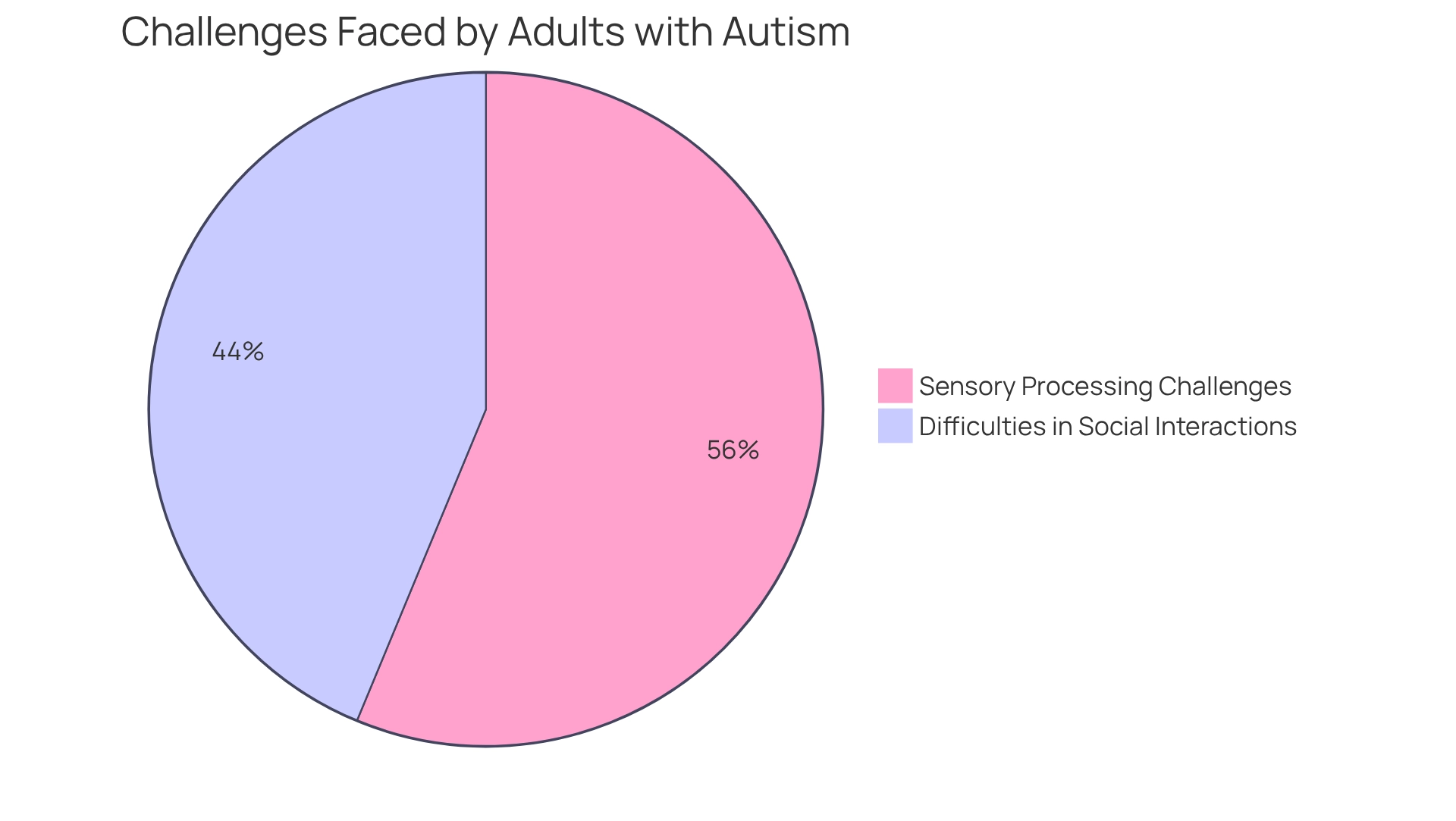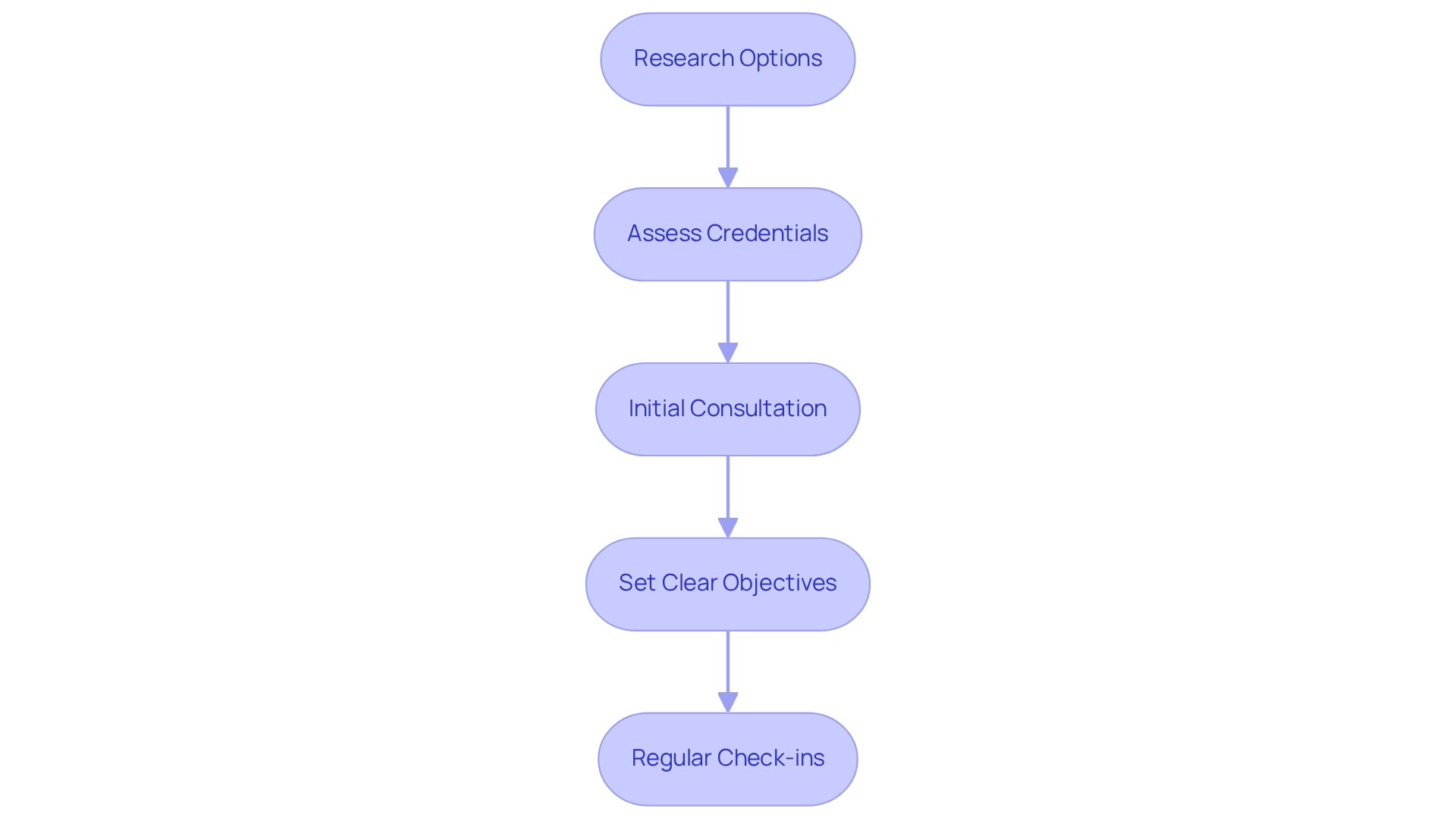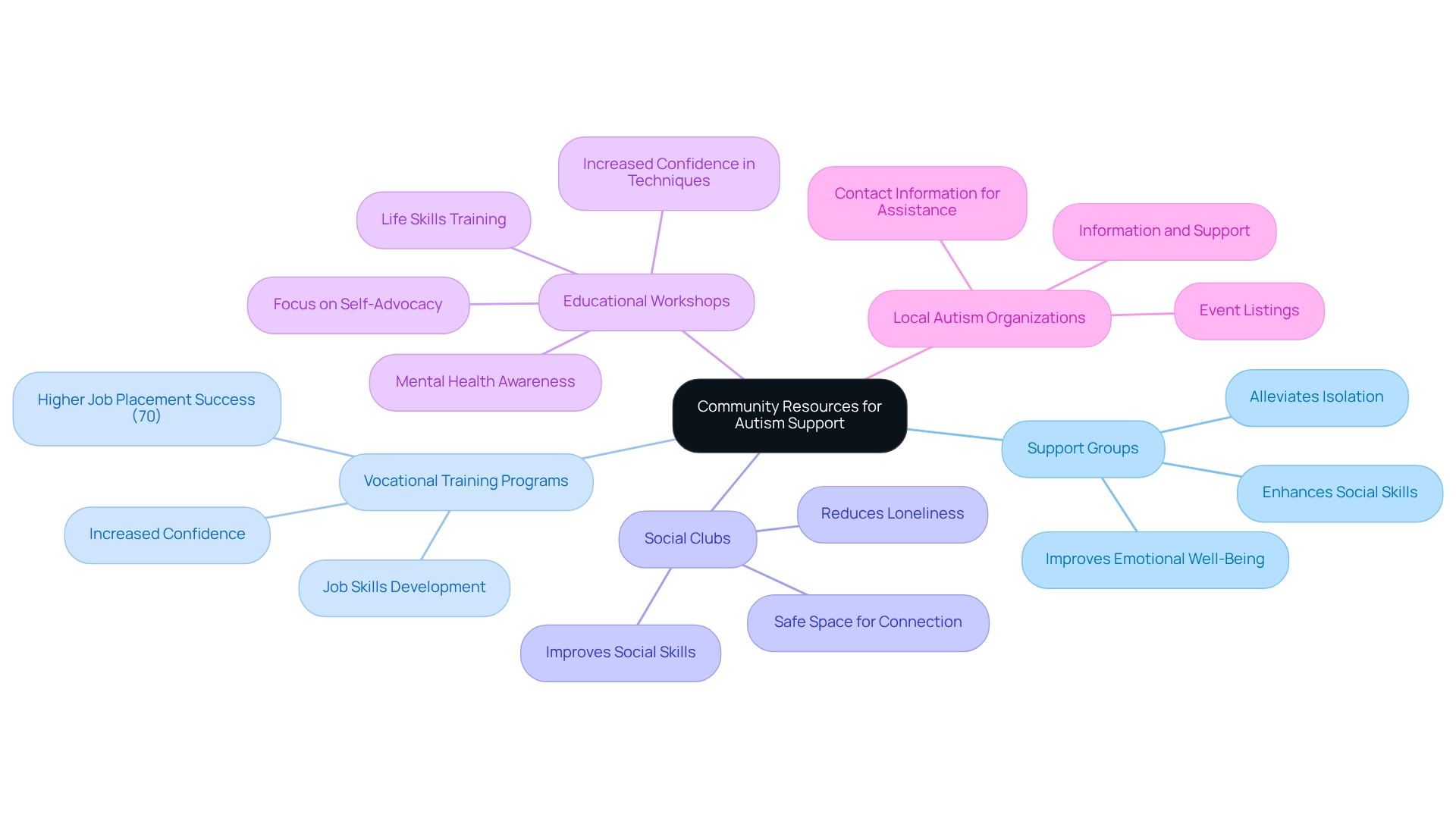Overview
This article highlights the crucial steps for providing compassionate support in adult autism therapy. It emphasizes the importance of personalized approaches tailored to meet the diverse needs of individuals on the autism spectrum. By detailing various therapy options, it invites readers to consider the unique challenges faced, such as social interaction and sensory processing. Additionally, the role of community resources is underscored, showcasing how they can enhance therapeutic outcomes. Together, these elements create a comprehensive understanding of how to effectively support those navigating the complexities of autism.
Introduction
In the intricate world of adult autism, grasping the subtleties of individual experiences is vital. Each person's journey involves unique challenges, from social interactions and sensory processing to cognitive styles and therapeutic options.
- With around 70% of autistic adults encountering difficulties in social situations
- Nearly 90% dealing with sensory sensitivities
The need for personalized support strategies has never been more urgent. This article aims to illuminate the essential characteristics of adult autism, explore effective therapy options, and offer guidance for navigating the therapy landscape. Furthermore, it underscores the significance of community resources and support systems that can profoundly improve the quality of life for autistic individuals.
By nurturing a deeper understanding of these elements, families and advocates can more effectively support and empower autistic adults on their distinct paths.
Explore the Fundamentals of Adult Autism
Adult autism encompasses a diverse array of characteristics and behaviors that can vary significantly among individuals. Understanding these differences is essential in fostering a supportive environment for those on the spectrum, especially in the realm of adult autism therapy.
Social Interaction: Many individuals on the autism spectrum encounter challenges with social cues and communication, which can impede their capacity to establish and sustain relationships. It's important to note that recent studies indicate approximately 70% of individuals with autism report difficulties in social interactions. This highlights the necessity for customized support strategies in adult autism therapy. Judith Ursitti, co-founder and president of the Profound Autism Alliance, emphasizes that the ongoing acknowledgment of profound autism will create opportunities for more inclusive research, essential for focused advocacy and enhancing access to necessary supports.
Sensory Processing: Sensory sensitivities are common, with numerous people experiencing overwhelming reactions to certain sounds, lights, or textures. Research shows that nearly 90% of individuals on the autism spectrum face sensory processing challenges, which can significantly impact their everyday lives. Recognizing these sensitivities can help caregivers create more accommodating environments in the context of adult autism therapy. Understanding these patterns can assist caregivers and professionals in establishing supportive environments that cater to individual needs in adult autism therapy, as autistic individuals often display distinctive cognitive processing styles that affect their learning and problem-solving methods. Recognizing these differences is crucial for effective intervention and support in adult autism therapy; additionally, understanding the costs associated with autism services is vital for families and advocates. For instance, therapeutic behavioral services average $175.44, while adaptive behavior services cost approximately $82.25. Grasping these basics is essential for anyone looking to provide effective assistance or support in adult autism therapy. This knowledge informs the development of strategies and interventions that can significantly enhance their quality of life.
By sharing experiences and insights, we can collectively foster a more inclusive environment for individuals with autism. What challenges have you faced, and how have you navigated them? Your story might inspire others on this journey.

Examine Therapy Options for Adults with Autism
There are many effective therapy options available for adults with autism, each designed to meet individual needs with care and compassion:
- Cognitive Behavioral Therapy (CBT): This evidence-based approach is crucial in helping individuals manage anxiety and depression by reshaping negative thought patterns. Recent studies emphasize the need for definitive trials to validate CBT as an empirically supported treatment for those with autism spectrum disorders. As Lisa Weston insightfully notes, "Definitive trials are needed to demonstrate that CBT is an empirically validated treatment for use with people who have ASDs."
- Applied Behavior Analysis (ABA): A cornerstone of adult autism therapy, focuses on modifying specific behaviors. Its adaptability allows for improvements in social skills and reductions in challenging behaviors, making it a dynamic option for adult autism therapy.
- Interpersonal Skills Training: This approach, known as adult autism therapy, aims to enhance interpersonal abilities through structured practice and constructive feedback, fostering better communication and relationship-building.
- Occupational Assistance: A form of adult autism therapy, focuses on enhancing daily living and work skills while emphasizing sensory integration and functional abilities to help individuals navigate everyday challenges.
- Mindfulness and Relaxation Techniques: These are effective in adult autism therapy, as they assist in managing stress and improving emotional regulation, contributing to overall well-being.
It's important to recognize that the diversity in treatment protocols, as highlighted in recent studies, complicates the analysis and interpretation of treatment effects. This suggests a need for more uniform intervention protocols in future research. Moreover, the significant number of studies that did not specify a primary outcome measure underscores the necessity for more rigorous research in the field. When selecting an adult autism therapy option, it is important to consider the individual's specific needs, preferences, and goals. This personalized approach is essential in maximizing the effectiveness of the chosen therapy.
Navigate the Process of Finding and Engaging with Therapy
Locating and interacting with counseling can be a transformative journey, involving several essential steps that significantly impact the support received:
- Research Options: Start by exploring local therapists who specialize in autism. Resources such as Autism Speaks or local autism societies can help you identify qualified professionals who understand your unique needs.
- Assess Credentials: It's important to verify that the therapist has the necessary qualifications and experience in adult autism therapy. The effectiveness of treatment often hinges on the therapist's expertise. Look for credentials like BCBA (Board Certified Behavior Analyst) or similar qualifications.
- Initial Consultation: Schedule an initial meeting to discuss treatment goals, approaches, and overall compatibility with the therapist. This step is vital for establishing a trusting relationship, which is the foundation of effective therapy.
- Set Clear Objectives: Collaborate with the therapist to establish clear, attainable goals for treatment. This ensures that both parties are aligned on expectations and outcomes, fostering a sense of partnership in the therapeutic process.
- Regular Check-ins: Maintain open communication with your therapist to evaluate progress and make necessary adjustments. Ongoing assessment is essential for optimizing the therapeutic journey. Remember, the duration of adult autism therapy may vary for each person, and continuous monitoring is crucial in determining the optimal length of care.
By following these steps, individuals and families can navigate the support landscape effectively, ensuring they find the right assistance tailored to their needs. Case studies have shown that effective interventions in ABA practices can lead to substantial improvements in managing challenging behaviors, enhancing social interactions, and overall quality of life for individuals on the autism spectrum. As the field of autism treatment evolves, staying informed about emerging research and techniques is vital for achieving the best outcomes. Therapy interventions rooted in cognitive behavioral therapy (CBT) can yield effective results when tailored to the needs of individuals on the autism spectrum, highlighting the importance of personalized approaches.

Leverage Community Resources and Support Systems
Community resources and support networks play a vital role in enhancing the lives of individuals on the autism spectrum, particularly through adult autism therapy. These resources are not just services; they are lifelines that can transform experiences and foster a sense of belonging. Here are some key components to consider:
- Support Groups: Engaging in local or online support groups creates a community where shared experiences can significantly alleviate feelings of isolation. Research shows that participation in these groups can lead to improved emotional well-being and social skills, making a profound difference in everyday life.
- Vocational Training Programs: These programs are essential for helping individuals on the autism spectrum develop job skills and secure meaningful employment. Studies indicate that those who participate in vocational training experience higher success rates in job placement and retention, with many reporting enhanced confidence in their abilities. In fact, statistics reveal that vocational training programs boast a success rate of over 70% in assisting participants to find and maintain employment.
- Social Clubs: Customized social activities for individuals on the spectrum can greatly improve social skills and reduce feelings of loneliness. These clubs offer a safe space for individuals to connect, engage, and form meaningful relationships.
- Educational Workshops: Many organizations provide workshops focused on self-advocacy, life skills, and mental health. These workshops equip participants with practical tools to navigate daily challenges and advocate for their needs effectively. A case study titled 'Autism Therapy Workshops' highlights the effectiveness of such workshops, showing that participants reported increased confidence and competence in applying various therapeutic techniques.
- Local Autism Organizations: Resources from organizations like the Autism Society and local advocacy groups are invaluable for obtaining information and support. They often provide listings of services, events, and additional resources tailored to the unique needs of individuals on the autism spectrum. For further inquiries and assistance, contact information for these organizations is readily available.
By leveraging these resources, autistic adults can engage in adult autism therapy to cultivate a more supportive environment that enhances their overall well-being and success. The impact of support groups, in particular, has been highlighted in various case studies, demonstrating their effectiveness in building confidence and competence among participants. As Chi poignantly expressed, 'I feel trapped. I have a weird tension in my head or my arms I want to get out... I lose sight of what is socially appropriate and start to say things I either don’t mean or something I’ve wanted to say deep down.' This underscores the importance of adaptable support systems in fostering growth and development, a sentiment echoed by O. Ivar Lovaas, who stated, 'If they can't learn the way we teach, we teach the way they learn.

Conclusion
Understanding adult autism requires a nuanced appreciation of the unique challenges faced by individuals on the spectrum. This article highlights critical aspects such as:
- Social interaction difficulties
- Sensory processing sensitivities
- Distinctive cognitive styles
Each element underscores the importance of tailored support strategies to enhance the quality of life for autistic adults. With approximately 70% experiencing social challenges and nearly 90% facing sensory issues, the urgency for personalized therapeutic approaches is clear.
Various therapy options, including:
- Cognitive Behavioral Therapy
- Applied Behavior Analysis
- Occupational Therapy
offer pathways for individuals to manage their symptoms and improve their daily functioning. Selecting the right therapy necessitates careful consideration of personal needs and goals, ensuring a customized approach that maximizes effectiveness. The navigation process for finding appropriate therapy is equally important, emphasizing the need for informed decision-making and regular communication with therapists.
Community resources and support systems further enrich the lives of autistic adults, providing essential networks for social engagement and skill development. Support groups, vocational training, and educational workshops create opportunities for personal growth and connection, reinforcing the notion that no one should navigate this journey alone.
In conclusion, fostering a deeper understanding of adult autism is crucial for advocates, families, and the broader community. By prioritizing individualized support and leveraging available resources, we can empower autistic adults, helping them thrive in their unique journeys. Together, our collective effort to enhance awareness and accessibility can lead to meaningful change, improving not just individual lives but also enriching our communities as a whole.
Frequently Asked Questions
What is adult autism and why is understanding its characteristics important?
Adult autism encompasses a diverse array of characteristics and behaviors that vary among individuals. Understanding these differences is essential for fostering a supportive environment, particularly in the context of adult autism therapy.
What challenges do individuals on the autism spectrum face regarding social interaction?
Many individuals with autism encounter challenges with social cues and communication, which can hinder their ability to form and maintain relationships. Approximately 70% of individuals with autism report difficulties in social interactions, highlighting the need for customized support strategies in adult autism therapy.
How prevalent are sensory processing challenges among individuals with autism?
Sensory processing challenges are common, with nearly 90% of individuals on the autism spectrum experiencing overwhelming reactions to certain sounds, lights, or textures. Recognizing these sensitivities is crucial for caregivers to create accommodating environments in adult autism therapy.
Why is it important to understand cognitive processing styles in individuals with autism?
Autistic individuals often display distinctive cognitive processing styles that affect their learning and problem-solving methods. Recognizing these differences is vital for effective intervention and support in adult autism therapy.
What are the average costs associated with autism services?
Therapeutic behavioral services average $175.44, while adaptive behavior services cost approximately $82.25. Understanding these costs is essential for families and advocates looking to provide effective support in adult autism therapy.
How can sharing experiences contribute to the autism community?
By sharing experiences and insights, individuals can collectively foster a more inclusive environment for those with autism. Personal stories may inspire others navigating similar challenges.




